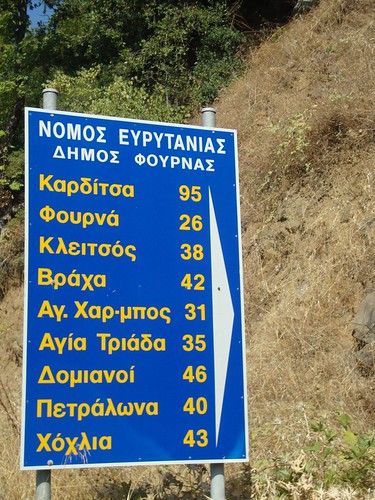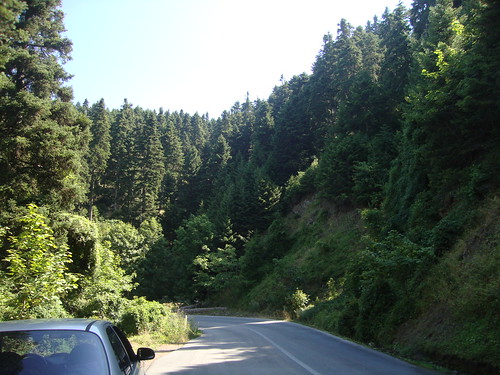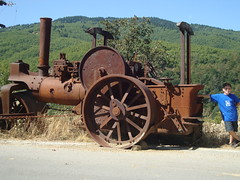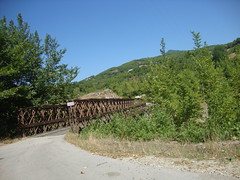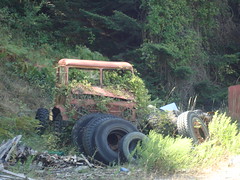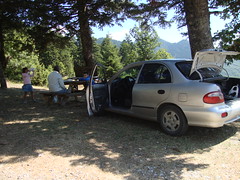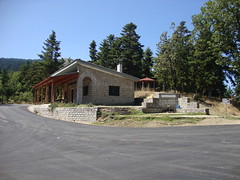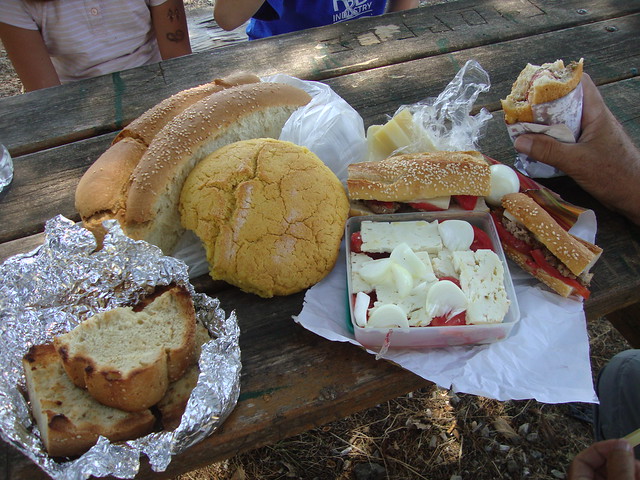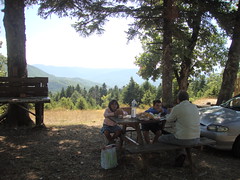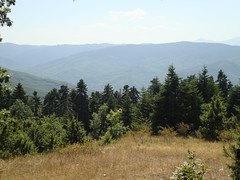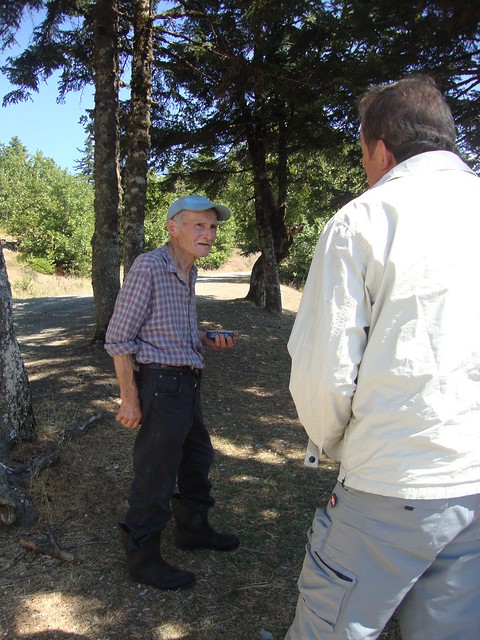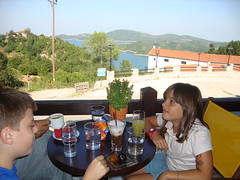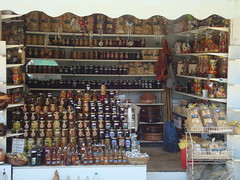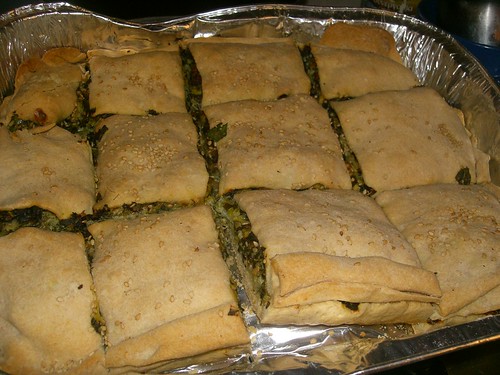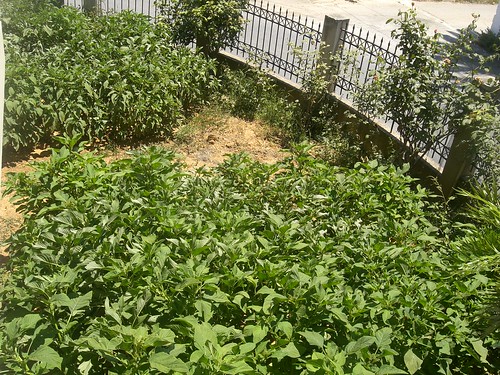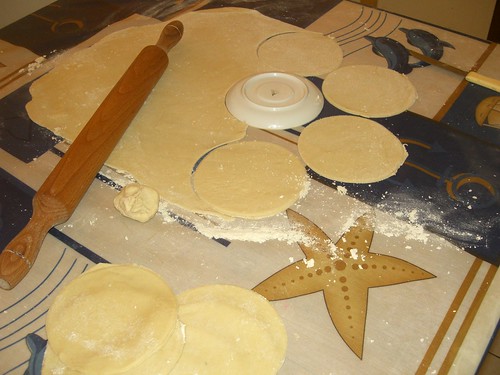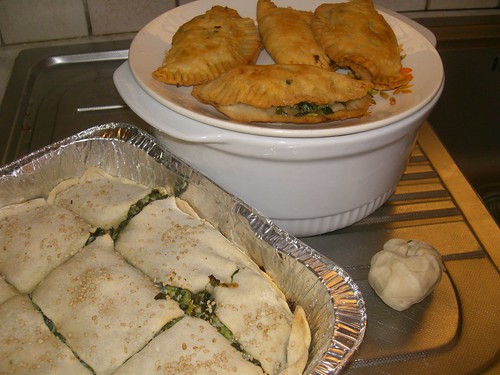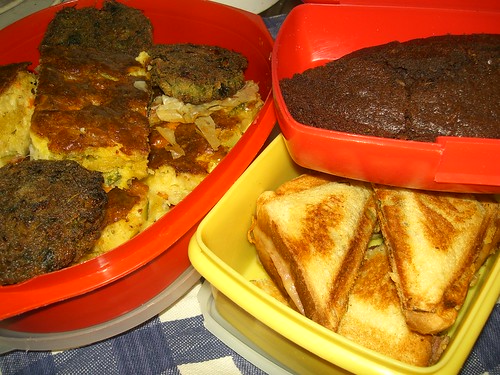Tune in every second day this week to see how we spent our family holiday in Central/Northern Greece.
Evritania is the most mountainous region in Greece. It remains the least accessible for this reason, but at the same time, it also contains some of the most dramatic landscapes you will encounter in the country: tall peaks with sudden drops in altitude, dense forests with rivers gushing their waters even in summertime, alpine landscapes blessed with Mediterranean sunshine. It also possesses some of the least explored Greek countryside, given its difficult driving conditions. The weather is very changeable in this region, so that at many times, you might experience the four seasons all on the same day; if you don't know the roads of the region very well, you could end up rolling the car into a ditch and getting stuck for hours before anyone comes along to help.
While we were in the region, we decided that it wouldn't have been worthwhile if we didn't explore all those difficult-to-access places, because if we didn't make an effort to get to them now, just think how likely it would be for us to get to them at a later time, when we wouldn't be touring the same region and the austerity measures began to hit us hard.
"You're setting yourself a difficult task," Hrisida exclaimed when we told her we wanted to visit Limni Plastira (Plastiras Lake). "It looks like its directly north from Karpenisi, but there is no direct arterial route to get there. If you choose the road via Fourna village, you'll need at least two and a half hours to get to your final destination, and you'll be driving along very narrow windy unmarked roads, I wouldn't do it with two children in tow."
"Are you worried we will see ghosts like the time we visited Kremasta Lake?", I enquired sarcastically. Maybe she was trying to scare us into not going.
"Don't be silly," she laughed me off. "This lake doesn't have drowned villages lying on its bed. It's just got an airfield." Once Plastiras Lake was built in 1959, it turned the mountain villages into lakeside resorts.
"Sounds good to me," I said. "How long will it take us if we stick to the main roads instead?" This meant that we would be driving more kilometres, but the route was easier because we would be sticking to the national highways.
"Oh, about two hours," she replied, "or so," she added as a mumbled afterthought. We figured it would take us the same amount of time any which road we took. So we decided to do the long and winding scenic road first and return via the easier route. Remember Cavafy when he tells you to pray that the journey to Ithaca is long, and full of adventure?
"OK," she waved us off, "have fun, it's a nice day for it," she cheered us on, "and take care on the road. Driving conditions are good until Fourna, and after that, just be careful: remember, we don't drive more than 50km/h on those roads." We thanked her and set off, lunches packed, and water bottles empty - there would be plenty of clean ice-cold water en route through this mountainous region sandwiched between Agrafa and Farsala, some of the most famous landmark villages of the area.
At the village of Timfristos, we realised we should have topped up our petrol tank, so we stopped at the main square to ask the old people gathered at a cafe there where the nearest service station was.
"Which direction are you driving in?" they all asked at once, showing great interest in the destination of strangers in their parts, with their out-of-town licence plates, maps in hand and cameras swinging from their necks.We stuck out like sore thumbs.
"We're heading towards Plastiras Lake," I replied.
"PLAS-TI-RAS?!" an old man cried. "You're going the wrong way!"
"When did you last go to Plastira, Cosma?" the other men in the parea groaned.
"Take the road to Redina," another one quipped.
"Don't go from there!" one more cried. No one had, as yet, told me where to fill up on petrol.
"Stop talking all at once," said a middle-aged woman dressed in tidy village garb, carrying a black handbag, who was sitting on a bench near the main square, looking as though she was waiting for the next bus to pass. This had an immediate effect on all of them: they shut up immediately.
I asked the group if the road to Kleitso was good enough for a small family car like ours. They all rolled their eyes.
"Oh, you don't want to go from Kleitso, dear," one man said. "You need to take the road to Redina." But I had studied the map quite well the night before. Going through Redina would mean taking a detour and the drive would take longer. I was sure there was a road going from Kleitso to Plastiras Lake. I didn't recall my friend mentioning the village of Redina, only Fourna.
"Why can't I go through Kleitso and then on to Neraida?" I asked, showing him the map.
"Kleitso!" he exclaimed in horror. "Don't even think about it!" he said. he waved his hand in the air. "I can't see that," he said, pointing to the map, "I haven't got my reading glasses with me. But I know that that road is full of nasty turns and bends, so it'll take a long time to get to the lake from there, and I can't recommend that it's in good condition." He looked at my car. "Don't think you'll get far with that out there," he chuckled. How strange, I thought, wouldn't my friend have told me that before I started out? I asked him once more where I should go to find a petrol station.
"Ai-yioryi," he replied. Short for Agios Georgios; it was on our map. That would involve a much smaller detour than the proposed route from Redina. I thanked him and got back into the car. Close by to Ai-yioryi, we came upon a road sign showing the distances to all the surrounding area. Kleitsos was mentioned; Redina wasn't. We took the road for Kleitsos.
But there were a number of sights on that road that reminded me of its remoteness to the modern world, signs of former times when people were were cut off from each other and communication would have been hampered by the peaks and waterways that Euritania is so well known for, exactly that which gives her a feeling of inaccessibility. Just past the village of Fourna, we were reminded of the enemy with the presence of a rusty WW2 road roller, and a little further on, a wooden bridge. The Nazis wanted roadways running through Greece to make it easier to conquer the country, just like the modern German tourists who want good driving conditions during their holidays, so they bought their technology with them to accomplish the task. Who knows what the condition of the road at this point might have been, had the area not been given a head start in the 1940s?
Tiny villages with roughly built houses, functional buildings and flowering gardens, grape vines covering the yards with people sitting under their shade; these people looked more than pleased to be tucked away from the main drag on a remote patch of land. Despite the forests and hills that kept the locals of the area well separate - and well protected - from the perils of the rat race, it was clear that life was running through the veins of these sparsely populated areas. The public rubbish bins were being emptied as we passed through the area, a modern sign of people's mark in an area. These people must be doing something here that enables them to live far away from the urban world; a vegetable garden, some animals, cheese-making, some beans for the winter and corn for the summer were probably sustaining them, providing them them a reason not to leave their ancestral lands. Crisis? What crisis? If you have land, you have food; if you have food, you don't starve. The forests shade them from the heat in the summer, and provide them with firewood for the winter. What else is necessary? Contrary to what we are being led to believe, these people like the way they live.
An hour into our journey, we had just passed the village of Kleitso, when we began to drive on what felt like a particularly long stretch of empty road. Up to that point, there had been the odd village or two emerging after every few minutes or so of driving, where human existence was visible. But at this point, out of nowhere, the road suddenly gave way to a clearing where a number of roads met up, with a children's playground situated across from a church, a spring and what looked like a house. Near the playground was a picnic area. There could not have been a more perfect place for us to rest our car and refresh ourselves with a picnic. Was this the middle of nowhere? It did not concern us - at that moment, it felt like the best place to be on earth.
The sun's rays were beating down on us, but we did not feel the heat. A cool breeze was blowing, which made us return to the car to get our jackets. Unbeknownst to us at the time, we had reached 1200m above sea level, and the place where we had parked our car was a very significant historical site. Not that it would have meant much to us at that moment: we felt like we were the first to find it, since we were alone up here, all by ourselves, enjoying one of the most magnificent views. A packed lunch, ample supplies of refreshing spring water, the clear view and the clean mountain air made us feel like the luckiest people on earth. Who could afford such a view? Who could afford such a clean environment? How many people were in that fortunate position to be able to enjoy this moment at least once in their life? We felt utterly thrilled to have got this far. Hooray for our old car that never let us down, hooray for our good fortune to take this route, hooray to us, for there could not have been luckier people in the world enjoying a moment like this one than ourselves.
We ate slowly, but we got through it all: sandwiches, boiled eggs, graviera, tomato and cheese salad which we ate with the gritty corn bread (that was something new to us) and the soft white rolls we had bought from the bakery in Karpenisi that morning. The fresh crisp mountain air whets your apetite. We kept filling our water bottles with the refreshing icy cold water from the spring. And when the picnic was over, we began to pack up our bags, making sure that we left no rubbish behind. We wanted to treat our host with the respect that our host had shown to us.
It was at this moment that the old man appeared. I had just packed up the last of our picnic utensils and was shaking the crumbs out of the plastic bags onto the ground to make a worm's or bird's dinner. The children had gone to the swings to amuse themselves before we left the area. The man was walking very slowly towards us, emerging from the steep hill that we had driven up. He had a thin wiry body, probably from the amount of walking that he did in these remote parts of the mountains; this could not have been his first time up here on foot. He looked well kept for an old man: his clothes were clean and tidy, his face was shaved, and his boots seemed sturdy. He was carrying something: an old sardine can, which was filled with what looked like a dry grassy weed. Before we had the chance to ask him what he was carrying, he walked in our direction and greeted us.
"Kalimera," he said, smiling, showing his toothless mouth, a sign of the bad dental health typical of this man's age group. It's usually a sign of the sacrifices these people have made to raise their families, not a sign of a lack of available care. The old man did not take a seat on the picnic bench, nor did he seem tired.
"Kalimera," we all replied, wary that we were strangers to his part of Greece and not wishing to make any wrong move that may offend.
"You're not from here, are you?" he guessed correctly. We told him we were Cretans taking our holidays here.
"Oh, Crete, it's nice down there, isn't it?"
"Have you ever visited?" my husband asked.
"No, no, I've just seen pictures on television." This old man looked as though he had never left the area. Now there was a split second of silence, like the moment when you want to ask a million questions but you don't know which one to ask first, the moment you want to start a long conversation but you know you don't have this luxury.
"Are you from the area?" my husband asked the man.
"Yes," he replied, "I live in the neighbouring village." He mentioned the name but we didn't catch it. It did not sound like one of the villages I could recall passing."Been here since I got married. I'm from another village, just further along this road," he said, pointing to one of the roads in the junction near the church, "You're just passing through, I suppose."
"Yes, we're on our way to the lake."
"Oh, the lake, I went there once, a long time ago, when it was first filled." He paused for a moment. "Lots of people go there on a trip."
"Yes," my husband nodded. But we were curious. "And er... what are you doing walking up here alone?" my husband asked him.
"Oh, I live here in the summer, near my sheep". He pointed to the road behind him. "I've got a small hut here where I rest and sleep. I usually stay here all the summer."
"Oh... it's beautiful up here."
"Yes," the man said slowly, in a neutral voice, neither agreeing or disagreeing. "It's good up here." He stopped and looked around the area, his eyes gazing at the mountain face covered in fir trees. "Life's dealing us hard blows these days," he continued. "I like to get away from it all up here, it feels better to be far away from the madness," he laughed, sounding quite youthful, despite his old-age croaky voice. "It's sometimes better to get away, but it's not an easy life wherever you are, and it doesn't seem to be getting easier, either way." The men discussed the economic crisis and its consequences on our lives. During this discussion, the old man revealed to us that his wife lived in the village and he had two sons, one living in the large urban area of Lamia, while the other was aborad (he didn't specify where). They were both married with families of their own. I wondered when the last time was that his grandchildren had seen him.
"What can they do?" he said. "There are no jobs here even if they wanted to stay. There's no life these days as a farmer here, what with the loneliness and when winter sets in. There's no money, either."
At this point, I felt saddened that we had eaten everything in our picnic, except the apples, and we could not offer the man anything, but then again, he wouldn't have been able to chew on the apples, what with no teeth. Then I remembered the biscuits we had left behind at the hotel room, which could be dunked in milk or water and softened enough to become easy to digest. I had been toying with the idea of taking them with us, and left them in the room at the last minute.
"Does it snow here in the winter?" one of my children asked the man.
"Oh, it snows a lot here," he replied, "all the trees get covered in snow in the winter, and the road is cut off until the snow plough comes along to clear it. It doesn't snow so much in Crete, does it?" he asked us.
This man had probably been born and lived within a radius of 20-25 kilometres all his life. He might have travelled as far as Athens, maybe even Thessaloniki, but not much farther. A feeling of loneliness crept upon me as I watched him, but at the same time, I knew that this man's whole world had always consisted of these mountains and a flock of sheep; he has known no other world. I thought about my mother in law who lives in the same building as us, and tried to put the thought out of my mind that this man could have an accident here and not be found until it was too late.
"Do you per chance have a cigarette?" he asked us.
"Oh, you got us there," my husband chuckled, "we are both non-smokers." At that moment, our souls were crushed, our hearts were broken and our minds were fraught with guilt. We had nothing to offer this man, not even a cigarette. The size of his pension was not a question: he could probably afford a cigarette, but there was nowhere to buy it here.

"Well, I'd better be off now, I suppose," he said. "It's been nice meeting you." He shook my husband's hand. "I hope you enjoy yourselves here. The lake shouldn't be too far away from here." As he walked off down the path he had indicated where his sheep were waiting for him, we got back into the car and drove away, feeling quite devastated. We had been given the opportunity to take in everything that the area offered to us, but we could not offer anything in return. By this chance encounter, we had caught a glimpse of life in the middle of nowhere, where you could feel nameless and your existence could be forgotten, even though you yourself would carry on living, without ever questioning if life was actually worth living. When all you have is a piece of ancestral land, you live off that. You don't expect much more to life, that's the farmer's lot. Your main hope is to go through the cycle of life without burdening anyone along the way.
I wonder what he's doing now, a month after we came across him. It's probably cold up at St Anna's church, and the snow will soon start falling. Pretty soon, he will be leaving the area with his sheep (that is, if he has not already left), in search of warmer climes in the lower regions. Most likely he will be thinking about summertime, in the hope of returning to his hut. I think I'll buy a packet of cigarettes and leave it in the storage drawer of the car, just in case.
©All Rights Reserved/Organically cooked. No part of this blog may be reproduced and/or copied by any means without prior consent from Maria Verivaki.
Evritania is the most mountainous region in Greece. It remains the least accessible for this reason, but at the same time, it also contains some of the most dramatic landscapes you will encounter in the country: tall peaks with sudden drops in altitude, dense forests with rivers gushing their waters even in summertime, alpine landscapes blessed with Mediterranean sunshine. It also possesses some of the least explored Greek countryside, given its difficult driving conditions. The weather is very changeable in this region, so that at many times, you might experience the four seasons all on the same day; if you don't know the roads of the region very well, you could end up rolling the car into a ditch and getting stuck for hours before anyone comes along to help.
While we were in the region, we decided that it wouldn't have been worthwhile if we didn't explore all those difficult-to-access places, because if we didn't make an effort to get to them now, just think how likely it would be for us to get to them at a later time, when we wouldn't be touring the same region and the austerity measures began to hit us hard.
"You're setting yourself a difficult task," Hrisida exclaimed when we told her we wanted to visit Limni Plastira (Plastiras Lake). "It looks like its directly north from Karpenisi, but there is no direct arterial route to get there. If you choose the road via Fourna village, you'll need at least two and a half hours to get to your final destination, and you'll be driving along very narrow windy unmarked roads, I wouldn't do it with two children in tow."
"Are you worried we will see ghosts like the time we visited Kremasta Lake?", I enquired sarcastically. Maybe she was trying to scare us into not going.
"Don't be silly," she laughed me off. "This lake doesn't have drowned villages lying on its bed. It's just got an airfield." Once Plastiras Lake was built in 1959, it turned the mountain villages into lakeside resorts.
"Sounds good to me," I said. "How long will it take us if we stick to the main roads instead?" This meant that we would be driving more kilometres, but the route was easier because we would be sticking to the national highways.
"Oh, about two hours," she replied, "or so," she added as a mumbled afterthought. We figured it would take us the same amount of time any which road we took. So we decided to do the long and winding scenic road first and return via the easier route. Remember Cavafy when he tells you to pray that the journey to Ithaca is long, and full of adventure?
"OK," she waved us off, "have fun, it's a nice day for it," she cheered us on, "and take care on the road. Driving conditions are good until Fourna, and after that, just be careful: remember, we don't drive more than 50km/h on those roads." We thanked her and set off, lunches packed, and water bottles empty - there would be plenty of clean ice-cold water en route through this mountainous region sandwiched between Agrafa and Farsala, some of the most famous landmark villages of the area.
At the village of Timfristos, we realised we should have topped up our petrol tank, so we stopped at the main square to ask the old people gathered at a cafe there where the nearest service station was.
"Which direction are you driving in?" they all asked at once, showing great interest in the destination of strangers in their parts, with their out-of-town licence plates, maps in hand and cameras swinging from their necks.We stuck out like sore thumbs.
"We're heading towards Plastiras Lake," I replied.
"PLAS-TI-RAS?!" an old man cried. "You're going the wrong way!"
"When did you last go to Plastira, Cosma?" the other men in the parea groaned.
"Take the road to Redina," another one quipped.
"Don't go from there!" one more cried. No one had, as yet, told me where to fill up on petrol.
"Stop talking all at once," said a middle-aged woman dressed in tidy village garb, carrying a black handbag, who was sitting on a bench near the main square, looking as though she was waiting for the next bus to pass. This had an immediate effect on all of them: they shut up immediately.
I asked the group if the road to Kleitso was good enough for a small family car like ours. They all rolled their eyes.
"Oh, you don't want to go from Kleitso, dear," one man said. "You need to take the road to Redina." But I had studied the map quite well the night before. Going through Redina would mean taking a detour and the drive would take longer. I was sure there was a road going from Kleitso to Plastiras Lake. I didn't recall my friend mentioning the village of Redina, only Fourna.
"Why can't I go through Kleitso and then on to Neraida?" I asked, showing him the map.
"Kleitso!" he exclaimed in horror. "Don't even think about it!" he said. he waved his hand in the air. "I can't see that," he said, pointing to the map, "I haven't got my reading glasses with me. But I know that that road is full of nasty turns and bends, so it'll take a long time to get to the lake from there, and I can't recommend that it's in good condition." He looked at my car. "Don't think you'll get far with that out there," he chuckled. How strange, I thought, wouldn't my friend have told me that before I started out? I asked him once more where I should go to find a petrol station.
"Ai-yioryi," he replied. Short for Agios Georgios; it was on our map. That would involve a much smaller detour than the proposed route from Redina. I thanked him and got back into the car. Close by to Ai-yioryi, we came upon a road sign showing the distances to all the surrounding area. Kleitsos was mentioned; Redina wasn't. We took the road for Kleitsos.
*** *** ***
Driving through the mountainous regions of Evritania, we were quite surprised to find so many people on the road. We had been warned that the route we had chosen was considered remote, but that did not seem to be the case at all! Apart from simple cars like our own, there were pick-up trucks, whose drivers seemed to be local people getting their agricultural tasks done; then there were the service vehicles - DEH was quite busy today giving taxpayers their money's worth; the narrow winding roads, lined on both sides by dense forests, were also being used by large lorries. The road was tarmacked, with obvious signs of recent renovation; it felt quite safe, and the stream of traffic was a sign of development. The road was also a shortcut to the longer route used in former times before the road was renovated, a sign of progress and development, whose existence had not yet been disseminated very thoroughly. That is to the off-the-beaten-track traveller's advantage; being one of the few to know this is a triumphant feeling - we were not being harassed by too many other drivers on the road.But there were a number of sights on that road that reminded me of its remoteness to the modern world, signs of former times when people were were cut off from each other and communication would have been hampered by the peaks and waterways that Euritania is so well known for, exactly that which gives her a feeling of inaccessibility. Just past the village of Fourna, we were reminded of the enemy with the presence of a rusty WW2 road roller, and a little further on, a wooden bridge. The Nazis wanted roadways running through Greece to make it easier to conquer the country, just like the modern German tourists who want good driving conditions during their holidays, so they bought their technology with them to accomplish the task. Who knows what the condition of the road at this point might have been, had the area not been given a head start in the 1940s?
Tiny villages with roughly built houses, functional buildings and flowering gardens, grape vines covering the yards with people sitting under their shade; these people looked more than pleased to be tucked away from the main drag on a remote patch of land. Despite the forests and hills that kept the locals of the area well separate - and well protected - from the perils of the rat race, it was clear that life was running through the veins of these sparsely populated areas. The public rubbish bins were being emptied as we passed through the area, a modern sign of people's mark in an area. These people must be doing something here that enables them to live far away from the urban world; a vegetable garden, some animals, cheese-making, some beans for the winter and corn for the summer were probably sustaining them, providing them them a reason not to leave their ancestral lands. Crisis? What crisis? If you have land, you have food; if you have food, you don't starve. The forests shade them from the heat in the summer, and provide them with firewood for the winter. What else is necessary? Contrary to what we are being led to believe, these people like the way they live.
An hour into our journey, we had just passed the village of Kleitso, when we began to drive on what felt like a particularly long stretch of empty road. Up to that point, there had been the odd village or two emerging after every few minutes or so of driving, where human existence was visible. But at this point, out of nowhere, the road suddenly gave way to a clearing where a number of roads met up, with a children's playground situated across from a church, a spring and what looked like a house. Near the playground was a picnic area. There could not have been a more perfect place for us to rest our car and refresh ourselves with a picnic. Was this the middle of nowhere? It did not concern us - at that moment, it felt like the best place to be on earth.
A hunter's/climber's/walker's lodge is built here on the same spot that the famous hero of the Greek revolution George Karaiskakis fought off the Turks in 1824. The spring is named after him. The church honours St Anna.
The sun's rays were beating down on us, but we did not feel the heat. A cool breeze was blowing, which made us return to the car to get our jackets. Unbeknownst to us at the time, we had reached 1200m above sea level, and the place where we had parked our car was a very significant historical site. Not that it would have meant much to us at that moment: we felt like we were the first to find it, since we were alone up here, all by ourselves, enjoying one of the most magnificent views. A packed lunch, ample supplies of refreshing spring water, the clear view and the clean mountain air made us feel like the luckiest people on earth. Who could afford such a view? Who could afford such a clean environment? How many people were in that fortunate position to be able to enjoy this moment at least once in their life? We felt utterly thrilled to have got this far. Hooray for our old car that never let us down, hooray for our good fortune to take this route, hooray to us, for there could not have been luckier people in the world enjoying a moment like this one than ourselves.
We ate slowly, but we got through it all: sandwiches, boiled eggs, graviera, tomato and cheese salad which we ate with the gritty corn bread (that was something new to us) and the soft white rolls we had bought from the bakery in Karpenisi that morning. The fresh crisp mountain air whets your apetite. We kept filling our water bottles with the refreshing icy cold water from the spring. And when the picnic was over, we began to pack up our bags, making sure that we left no rubbish behind. We wanted to treat our host with the respect that our host had shown to us.
It was at this moment that the old man appeared. I had just packed up the last of our picnic utensils and was shaking the crumbs out of the plastic bags onto the ground to make a worm's or bird's dinner. The children had gone to the swings to amuse themselves before we left the area. The man was walking very slowly towards us, emerging from the steep hill that we had driven up. He had a thin wiry body, probably from the amount of walking that he did in these remote parts of the mountains; this could not have been his first time up here on foot. He looked well kept for an old man: his clothes were clean and tidy, his face was shaved, and his boots seemed sturdy. He was carrying something: an old sardine can, which was filled with what looked like a dry grassy weed. Before we had the chance to ask him what he was carrying, he walked in our direction and greeted us.
"Kalimera," he said, smiling, showing his toothless mouth, a sign of the bad dental health typical of this man's age group. It's usually a sign of the sacrifices these people have made to raise their families, not a sign of a lack of available care. The old man did not take a seat on the picnic bench, nor did he seem tired.
"Kalimera," we all replied, wary that we were strangers to his part of Greece and not wishing to make any wrong move that may offend.
"You're not from here, are you?" he guessed correctly. We told him we were Cretans taking our holidays here.
"Oh, Crete, it's nice down there, isn't it?"
"Have you ever visited?" my husband asked.
"No, no, I've just seen pictures on television." This old man looked as though he had never left the area. Now there was a split second of silence, like the moment when you want to ask a million questions but you don't know which one to ask first, the moment you want to start a long conversation but you know you don't have this luxury.
"Are you from the area?" my husband asked the man.
"Yes," he replied, "I live in the neighbouring village." He mentioned the name but we didn't catch it. It did not sound like one of the villages I could recall passing."Been here since I got married. I'm from another village, just further along this road," he said, pointing to one of the roads in the junction near the church, "You're just passing through, I suppose."
"Yes, we're on our way to the lake."
"Oh, the lake, I went there once, a long time ago, when it was first filled." He paused for a moment. "Lots of people go there on a trip."
"Yes," my husband nodded. But we were curious. "And er... what are you doing walking up here alone?" my husband asked him.
"Oh, I live here in the summer, near my sheep". He pointed to the road behind him. "I've got a small hut here where I rest and sleep. I usually stay here all the summer."
"Oh... it's beautiful up here."
"Yes," the man said slowly, in a neutral voice, neither agreeing or disagreeing. "It's good up here." He stopped and looked around the area, his eyes gazing at the mountain face covered in fir trees. "Life's dealing us hard blows these days," he continued. "I like to get away from it all up here, it feels better to be far away from the madness," he laughed, sounding quite youthful, despite his old-age croaky voice. "It's sometimes better to get away, but it's not an easy life wherever you are, and it doesn't seem to be getting easier, either way." The men discussed the economic crisis and its consequences on our lives. During this discussion, the old man revealed to us that his wife lived in the village and he had two sons, one living in the large urban area of Lamia, while the other was aborad (he didn't specify where). They were both married with families of their own. I wondered when the last time was that his grandchildren had seen him.
"What can they do?" he said. "There are no jobs here even if they wanted to stay. There's no life these days as a farmer here, what with the loneliness and when winter sets in. There's no money, either."
At this point, I felt saddened that we had eaten everything in our picnic, except the apples, and we could not offer the man anything, but then again, he wouldn't have been able to chew on the apples, what with no teeth. Then I remembered the biscuits we had left behind at the hotel room, which could be dunked in milk or water and softened enough to become easy to digest. I had been toying with the idea of taking them with us, and left them in the room at the last minute.
"Does it snow here in the winter?" one of my children asked the man.
"Oh, it snows a lot here," he replied, "all the trees get covered in snow in the winter, and the road is cut off until the snow plough comes along to clear it. It doesn't snow so much in Crete, does it?" he asked us.
This man had probably been born and lived within a radius of 20-25 kilometres all his life. He might have travelled as far as Athens, maybe even Thessaloniki, but not much farther. A feeling of loneliness crept upon me as I watched him, but at the same time, I knew that this man's whole world had always consisted of these mountains and a flock of sheep; he has known no other world. I thought about my mother in law who lives in the same building as us, and tried to put the thought out of my mind that this man could have an accident here and not be found until it was too late.
"Do you per chance have a cigarette?" he asked us.
"Oh, you got us there," my husband chuckled, "we are both non-smokers." At that moment, our souls were crushed, our hearts were broken and our minds were fraught with guilt. We had nothing to offer this man, not even a cigarette. The size of his pension was not a question: he could probably afford a cigarette, but there was nowhere to buy it here.

"Well, I'd better be off now, I suppose," he said. "It's been nice meeting you." He shook my husband's hand. "I hope you enjoy yourselves here. The lake shouldn't be too far away from here." As he walked off down the path he had indicated where his sheep were waiting for him, we got back into the car and drove away, feeling quite devastated. We had been given the opportunity to take in everything that the area offered to us, but we could not offer anything in return. By this chance encounter, we had caught a glimpse of life in the middle of nowhere, where you could feel nameless and your existence could be forgotten, even though you yourself would carry on living, without ever questioning if life was actually worth living. When all you have is a piece of ancestral land, you live off that. You don't expect much more to life, that's the farmer's lot. Your main hope is to go through the cycle of life without burdening anyone along the way.
*** *** ***
We continued on to Limni Plastira where we saw the dam that saved the whole region from serious drought, but throughout the journey, we were haunted by the image of the old man.I wonder what he's doing now, a month after we came across him. It's probably cold up at St Anna's church, and the snow will soon start falling. Pretty soon, he will be leaving the area with his sheep (that is, if he has not already left), in search of warmer climes in the lower regions. Most likely he will be thinking about summertime, in the hope of returning to his hut. I think I'll buy a packet of cigarettes and leave it in the storage drawer of the car, just in case.
©All Rights Reserved/Organically cooked. No part of this blog may be reproduced and/or copied by any means without prior consent from Maria Verivaki.

